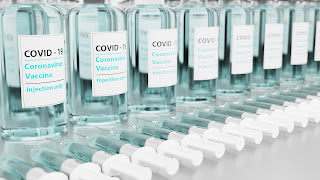Pfizer vaccination considerably less powerful in kids aged 5-11
Fresh data suggests that Pfizer's COVID vaccination is considerably less potent at preventing illness among children ages 5 to 11 than adolescents, a result that might leave some parents of younger children apprehensive.
The vaccine—the only one allowed for that age range in the United States—does prevent serious disease in young children, according to data obtained during the Omicron spike. But it gives essentially little protection against coronavirus infection, even within a month following complete vaccination, researchers noted.
Why? One explanation may be that youngsters get one-third the amount provided to older children and adults, experts and government officials who have analyzed the data told The New York Times. The negative findings reflect previous trial results that indicated the vaccination functioned poorly in youngsters aged 2 to 4, who got an even lower dosage.
"It's unfortunate, but not wholly unexpected, considering this is a vaccination created in response to an earlier variation," said research leader Eli Rosenberg, deputy director for science at the New York State Department of Health. "It seems quite sad to watch this quick fall, but it's again all against Omicron."
The results were published on the preprint platform medRxiv, and have not yet been peer-reviewed.
Despite the disappointing outcomes, Rosenberg and other public health experts said they advocate the injection for youngsters, since the vaccination continues to defend against serious illness in this population.
"We need to make sure we accentuate the doughnut and not the hole," Dr. Kathryn Edwards, a pediatric vaccination specialist at Vanderbilt University, told the Times.
In the newest research, Rosenberg and his colleagues reviewed data from 852,384 completely vaccinated adolescents aged 12 to 17 and 365,502 fully vaccinated children aged 5 to 11 between the middle of December and the end of January.
The vaccine's efficacy against hospitalization fell to 73 percent from 85 percent in the older children. In the younger youngsters, efficacy reduced to 48 percent from 100 percent. But since relatively few children were hospitalized, these calculations had enormous margins of error, the Times stated.
The vaccine's performance against infection was considerably worse: It declined to 51 percent from 66 percent in older children, while it plunged to 12 percent from 68 percent in younger children.
The statistics fluctuate considerably between ages 11 and 12. During the week ending Jan. 30, the vaccine's efficacy against illness was 67 percent in 12-year-olds, but just 11 percent in 11-year-old youngsters, the research revealed.
"The contrast between the two age groups is startling," Florian Krammer, an immunologist at the Icahn School of Medicine at Mount Sinai, told the Times.
The discrepancy may be related to dosage: While 12-year-old children got 30 micrograms of the vaccine—the same quantity given to adults—children who were 11 and younger received just 10 micrograms, he said.
"This is really fascinating because it would almost indicate that it's the dosage that makes the difference," he said. "The question is how to remedy it."
Just days ago, the U.S. Centers for Disease Control and Prevention announced new guidelines that would enable the majority of Americans to quit wearing masks, even in schools.
The new data also raises serious issues about the Biden administration's approach for vaccination younger children. Only around one in four children aged 5 to 11 has got two doses of the vaccination. And the U.S. Food and Drug Administration had previously postponed an expert panel meeting to assess two doses of the vaccine for children under 5 after Pfizer presented fresh data demonstrating two doses were not highly protective against the Omicron type.
Importantly, Pfizer, Moderna and Johnson & Johnson are all testing Omicron-specific versions of their vaccines.
Many parents wish to vaccinate their children to prevent them from transmitting the virus to susceptible relatives, to keep them in school or to minimize the chance of extended COVID. Experts recognized that the fresh evidence did nothing to relieve their fears.
Still, the immunizations "offer greater protection than we thought," Jessica Andriesen, a vaccine statistics specialist at the Fred Hutchinson Cancer Research Center in Seattle, told the Times. "They may also make it such that your child who comes home COVID isn't shedding virus as much as they would be if they weren't vaccinated, and they also may have it for a shorter length of time."
